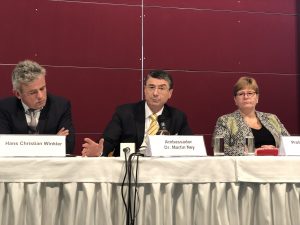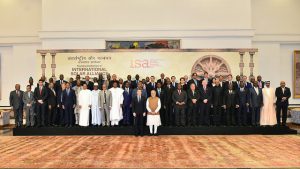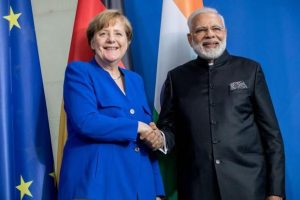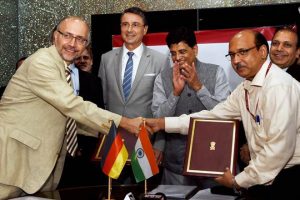
Ahead of the meeting between Prime Minister Narendra Modi and German Chancellor Angela Merkel on the side-lines of the G20 summit in Buenos Aires, German Ambassador to India Martin Ney has underlined Berlin’s readiness to join the India-initiated International Solar Alliance, a decisive move that will boost the multi-faceted green energy partnership between the two nations.
“ISA is a fabulous idea. This fantastic idea must be expanded geographically because it needs all hands on the deck. It would make a lot of sense to incorporate other countries,” the German ambassador said when asked by India Writes Network on Germany’s view on PM Modi’s proposal for expansion of the 121-nation ISA.

The envoy stressed that India wants Germany to be a part of ISA, and Germany, on its part, has applied for membership of ISA. “There is a lot of consensus in Germany on this (membership of the ISA),” he said at the German embassy in New Delhi on November 29 at a media interaction to mark 60 years of India-Germany development cooperation.
“Germany contributes to the goals of the ISA in a huge way in its bilateral development cooperation with India,” he said while alluding to expanding economic development partnership between India and Germany, which focuses a great deal on partnering in renewables and shaping a green future jointly.
On November 29, senior officials of India and Germany signed a protocol for $765 million euro as part of the economic development partnership financial package for 2018. This fund will be largely harnessed for renewable energy projects.
Issues relating to green energy partnership and development cooperation are expected to figure in talks between Mr Modi and Chancellor Merkel on the side-lines of the G20 summit in Buenos Aires.
Building on his vision of “One World, One Sun, One Grid,” PM Modi is expected to make a strong pitch at the G20 summit for expanding ISA to include even countries that are not in the Tropic of Cancer and Capricorn zone to join the 121-nation International Solar Alliance.
India Indispensable: ‘We want India on board’

The German envoy underscored the indispensability of India in addressing issues relating to global climate change and sustainable development. Placing the burgeoning green partnership between India and Germany in the larger perspective, the envoy said: “India and Germany are strategic partners. Germany wants India’s success for various reasons. We have a close friendship and partnership for decades.”
“Without India, we can’t solve global problems like poverty reduction and climate change. We want India on board,” he said.
“You have either India as part of the solution or as part of the problem. It’s in the interests of the world to have India as part of the solution.”

Positioning India-Germany development cooperation as “an equal cooperation at a high level,” the envoy outlined that it’s based “on a lot of trust and mutual respect,” and is underpinned by shared values, democracy and constitutional principles. He stressed that the India-Germany development cooperation will enable India to realise SDGs, Agenda 2030 and the goals of the Paris Accord.
The core focus areas of India-Germany development cooperation include Indo-German solar partnership, Cleaning River Ganga, Smart Cities and smart eco-friendly urbanisation, building of metros such as Nagpur Metro and Vocational and Educational Training (VET).
Author Profile

- Manish Chand is Founder and Editor-in-Chief of India Writes Network (www.indiawrites.org) and India and World, a pioneering magazine focused on international affairs. He is CEO, Centre for Global India Insights, an India-based think tank focused on global affairs.
Latest entries
 India and the WorldFebruary 17, 2026South-by-South: Focus on people-centric solutions at India AI summit
India and the WorldFebruary 17, 2026South-by-South: Focus on people-centric solutions at India AI summit India and the WorldFebruary 7, 2026Modi hails interim India-US trade deal, Goyal says no concessions made on agriculture
India and the WorldFebruary 7, 2026Modi hails interim India-US trade deal, Goyal says no concessions made on agriculture India and the WorldFebruary 2, 2026Trump announces trade deal with India, Modi ‘delighted’
India and the WorldFebruary 2, 2026Trump announces trade deal with India, Modi ‘delighted’ India and the WorldJanuary 31, 2026Palestinian minister bats for mediatory role for India in ending Gaza conflict
India and the WorldJanuary 31, 2026Palestinian minister bats for mediatory role for India in ending Gaza conflict







